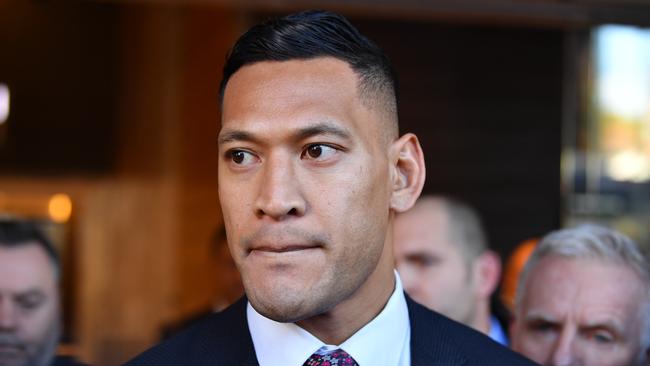Freedoms eroded by partisanship
The media should be a broad bias in favour of freedom of expression and religion.

Freedom is complex and relative, so a good deal of common sense is required when we debate issues such as freedom of speech, the press or religion and the case of Israel Folau.
Instead, too often it is not the principle that dominates many contributions to the debate, but the side.
In Me and Bobby McGee, Kris Kristofferson sang: “Freedom’s just another word for nothing left to lose.” It’s a line that some have mocked but I’ve always seen it as a lyrical reminder of the relativity of freedom: that the responsibility that comes with our job, possessions, relationships, children or other joys by necessity curbs our freedom.
Since biblical passages are in vogue, there are many references in the Bible that highlight paradoxes around freedom. Romans 8:16, for instance, says: “You have been set free from sin and have become slaves to righteousness.”
Considering the unlikely pairing of Kristofferson and the Bible, we can see Folau’s freedom cuts both ways.
Perhaps Rugby Australia has impinged upon his freedom of religion but certainly Folau has willingly surrendered his freedom elsewhere to become what he would consider a “slave” to righteousness.
And now he has also become the personification of a debate about freedom of religion and, in particular, the politically correct crusade against Christianity.
Partisanship has kicked in, with many on the liberal left who might ordinarily be expected to support freedom of expression arguing against Folau and seeking to dismiss the issue as no more than a contractual dispute.
The partisanship in this debate comes from many quarters — such as politicians, religious adherents and activists of one kind or another — but also includes, sadly, many in the media. Perhaps if people in the media want to advocate for media freedom — and they should — they would bolster their case if they were more genuinely committed to freedom in other spheres of public debate.
We accept, for instance, that the media have an obvious bias in favour of transparency. This is the perspective we expect from journalists: that they will always favour the release of information, leaking of secrets and the public reporting of debates.
It is, arguably, a required counterbalance against the propensity for secrecy from governments and other organisations. There is an inevitable and constant tension between these tendencies that we hope tends to be resolved in a way that loosely approximates the optimum public interest.
The media should also have an ingrained bias not just in favour of media freedom but freedom more broadly. Yet too often the principle can be forsaken in favour of the side.
In 2012, prominent journalists, including some at the national broadcaster, meekly accepted federal Labor’s attempts to impose de facto regulation on the print media. And now leading media commentators such as Peter FitzSimons and David Marr have championed the campaign against Folau, encouraging his public shaming and the destruction of his career.
The consequences of this for freedom of religion and expression are profound.
Even former Australian Human Rights Commission president Gillian Triggs has spoken sensibly on the Folau matter, pointing out there is a fundamental (and constitutional) freedom of religion that might (and should) trump any contractual conditions.
Triggs says the backlash against Folau is over the top. He “should be entitled to put his view” and it is “foolish and disproportionate” to prevent him from preaching his beliefs.
Obviously, people can lose their job over statements they make publicly or in the workplace. And clearly anyone in any line of work, let alone a public figure, needs to consider where those boundaries might fall, especially if there are relevant conditions in their contact.
But we need a commonsense threshold, and Folau’s social media posts seem a long way short of that measure.
Do we really want to live in a society where a public declaration of faith, paraphrasing biblical edicts, leads to dismissal?
Are we saying that it is acceptable for organisations to trumpet their “inclusiveness” by excluding fundamentalist Christians who dare to espouse their beliefs? Where will this end for Christians, Muslims, climate sceptics, those against immigration or opponents of constitutional recognition for indigenous Australians? Will wokeness become the new precondition to employment?
Folau was not vilifying anyone or, in his eyes, spreading hate. However silly, outdated or even offensive we might find his views, we know they are the teachings of many Christian churches and other religions. Indeed, we know such views were reflected in our own criminal law only decades ago.
There will be Christians and Muslims around the nation now worrying about the fragility of their employment. The live and let live ethos that has typified our national life is being eroded.
While the Folau controversy could go to the High Court and set a legal precedent it won’t be the final word on these tensions. Such debates will arise again and again.
Media operatives ought to think carefully about the positions they take.
Just as there is an ingrained and understandable media bias in favour of freedom of information and transparency, so should there be a broad bias in favour of freedom of expression and religion.



